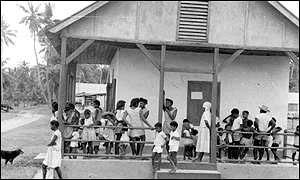| raceandhistory.com | hotep.bigstep.com | amonhotep.com | pantrinbago.com | World History |
Evicted islanders allowed home
BBC NEWSFriday, 3 November, 2000

Islanders lived a largely self-sufficient lifestyle
The UK Government acted unlawfully in sending thousands of Indian Ocean islanders into exile to make way for a US military base, the High Court has ruled.
The decision paves the way for the Chagos islanders to return to their home for the first time since the 1960s.
Islanders spokesman Oliver Bancoult, whose family have been exiled from there since 1968, called the ruling an "unforgettable moment".
"People who were unlawfully uprooted will be able to return freely and live in their homeland."
Lord Justice Laws said there had been "an abject legal failure" and immediately overturned a 1971 order that bans the islanders from going back to the island.
Between 3,000 to 4,000 islanders and their families are living in exile on Mauritius.
Lawyers for the islanders had argued that the authorities "rode roughshod" over their human rights and their rights as citizens of the UK, leaving them with a burning sense of injustice.
Their application for a judicial review was opposed by the Foreign and Commonwealth Office.
The decision is an embarrassment for the government, who may now have to ask the Americans to leave their military base on Diego Garcia, the principal island in the Chagos archipelago.
 Islander Louis Bancoult celebrates the victory |
The government is now considering its position.
Sir Sydney Kentridge QC, appearing for the islanders, had told the court at a hearing in July that the British authorities took steps to hide the truth from Parliament and the United Nations as the people of the Chagos archipelago were sent packing.
The islanders were "simply dumped on the dockside" 1,200 miles away on Mauritius and other faraway destinations between 1967 and 1973 and left to a life of distress and poverty which many were still experiencing, he said.
Mr Bancoult said the islanders would not accept any compromise that might see them occupy the other islands in the archipelago, while the US continues to operate from Diego Garcia.
"In our demands we have asked for all our islands including Diego Garcia. We have a fundamental right to return even if there is an agreement between America and the UK.
"Why should people from Singapore and the Philippines and elsewhere be allowed to go to work on Diego Garcia and we are not allowed return home to our motherland?"
Liberal Democrat foreign affairs spokesman Menzies Campbell said it was too late for the islanders to return home and urged the government to compensate them instead.
"This judgment is a matter of embarrassment to both the present government and its predecessors," he said.
But he added: "Return to the island would be fraught with great difficulties since the infrastructure has long since disappeared. The best solution now is for the government to offer generous compensation."
As part of the deal to acquire the site, the UK Government reportedly received an £11m discount off its US-made Polaris nuclear weapons system.
It also reportedly paid Mauritius £3m to take the islanders off its hands.
The islands, more than 1,000 miles from the nearest mainland, had been occupied by the local inhabitants - known as the Ilois - for 200 years or more.
Descendants of African slaves and Indian plantation workers, they lived a simple, largely self-sufficient lifestyle as fishermen, farmers and working in the coconut plantations.
The Chagos group came under British sovereignty when Mauritius, together with its dependencies, were ceded by France at the end of the Napoleonic war.
BBC NEWS
Friday, 4 November, 2000
The UK Government will not appeal against a High Court ruling that Britain acted unlawfully in sending thousands of Indian Ocean islanders into exile to make way for a US military base.
The decision paves the way for the Chagos islanders to return to their home for the first time since the 1960s.
Islanders' spokesman Oliver Bancoult, whose family have been exiled from there since 1968, called the ruling an "unforgettable moment".
"People who were unlawfully uprooted will be able to return freely and live in their homeland."
Earlier in the High Court, Lord Justice Laws said there had been "an abject legal failure" and immediately overturned a 1971 order that bans the islanders from going back to the island.
Between 3,000 to 4,000 islanders and their families are living in exile on Mauritius.
Lawyers for the islanders had argued that the authorities "rode roughshod" over their human rights and their rights as citizens of the UK, leaving them with a burning sense of injustice.
Their application for a judicial review was opposed by the Foreign and Commonwealth Office.
The government may now have to ask the Americans to leave their military base on Diego Garcia, the principal island in the Chagos archipelago.
The Foreign and Commonwealth Office was granted permission to appeal but later Foreign Secretary Robin Cook turned it down.
However, the government has not indicated whether it will apologise.
Sir Sydney Kentridge QC, appearing for the islanders, had told the court at a hearing in July that the British authorities took steps to hide the truth from Parliament and the United Nations as the people of the Chagos archipelago were sent packing.
The islanders were "simply dumped on the dockside" 1,200 miles away on Mauritius and other faraway destinations between 1967 and 1973 and left to a life of distress and poverty which many were still experiencing, he said.
Chagos islanders: 30 years of suffering
Evicted islanders' legal challenge begins
Memories of paradise lost